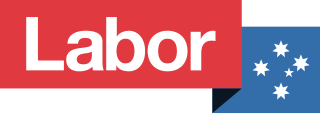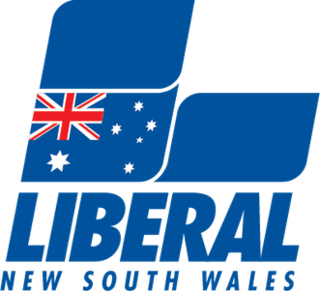
The Australian Labor Party (ALP), also simply known as Labor, is the major centre-left political party in Australia, one of two major parties in Australian politics, along with the centre-right Liberal Party of Australia. The party has been governing federally since being elected at the 2022 election, and with political branches in each state and territory, they are currently in government in New South Wales, Queensland, South Australia, Victoria, Western Australia, the Australian Capital Territory, and the Northern Territory – Tasmania is the only state or territory where they currently form the opposition. It is the oldest political party in Australia, being established on 8 May 1901 at Parliament House, Melbourne, the meeting place of the first federal Parliament.

The Country Liberal Party of the Northern Territory (CLP), commonly known as the Country Liberals, is a centre-right political party in Australia's Northern Territory. In local politics it operates in a two-party system with the Australian Labor Party (ALP). It also contests federal elections as an affiliate of the Liberal Party of Australia and National Party of Australia, the two partners in the federal coalition.

The Legislative Council, or upper house, is one of the two chambers of the Parliament of South Australia. Its central purpose is to act as a house of review for legislation passed through the lower house, the House of Assembly. It sits in Parliament House in the state capital, Adelaide.

The Family First Party was a conservative political party in Australia which existed from 2002 to 2017. It was founded in South Australia where it enjoyed its greatest electoral support. Since the demise of the Australian Conservatives into which it merged, it has been refounded in that state as the Family First Party (2021), where it contested the state election in 2022, but failed to win a seat.
Branch stacking is a term used in Australian politics to describe the act of recruiting or signing up members for a local branch of a political party for the principal purpose of influencing the outcome of internal preselection of candidates for public office, or of inordinately influencing the party's policy.
The state election for the 51st Parliament of South Australia was held in the Australian state of South Australia on 18 March 2006 to elect all members of the South Australian House of Assembly and 11 members of the South Australian Legislative Council. The election was conducted by the independent State Electoral Office.

The Liberal Party of Australia (New South Wales Division), commonly known as the New South Wales Liberals, is the state division of the Liberal Party of Australia in New South Wales. The party is currently in Opposition in New South Wales in a coalition with the National Party. The party is part of the federal Liberal Party which is in opposition nationally.

The Australian Greens Victoria, commonly known as the Victorian Greens or just as The Greens, is the Victorian state member party of the Australian Greens, a green political party in Australia.
Faceless men is a term from Australian politics. The term is generally used to refer to men and women who exert political influence and are not elected representatives to state, territory or federal legislative bodies, yet are elected representatives to bodies that determine political party policies. However, the political tactic of elected representatives canvassing party members for support on policies varies widely amongst Australian political parties.

Robert Bruce Such was a South Australian politician. He was the member for the seat of Fisher in the South Australian House of Assembly from 1989 until his death in 2014. He defeated Labor MP Philip Tyler at the 1989 election and was a member of the Liberals until 2000 when he became an independent. Such was Minister for Employment, Training and Further Education, and Minister for Youth Affairs, in the Brown Liberal government from 1993 to 1996. He served as Speaker of the South Australian House of Assembly for the Rann Labor government from 2005 to 2006. Such was joint Father of the House with Michael Atkinson from 2012.

State elections were held in South Australia on 17 September 1977. All 47 seats in the South Australian House of Assembly were up for election. The incumbent Australian Labor Party led by Premier of South Australia Don Dunstan won a fourth term in government, defeating the Liberal Party of Australia led by Leader of the Opposition David Tonkin.
Preselection is the process by which a candidate is selected, usually by a political party, to contest an election for political office. It is also referred to as candidate selection. It is a fundamental function of political parties. The preselection process may involve the party's executive or leader selecting a candidate or by some contested process. In countries that adopt Westminster-style responsible government, preselection is also the first step on the path to a position in the executive. The selected candidate is commonly referred to as the party's endorsed candidate.
Stephen Bruce Mutch is an Australian academic, and former politician with an academic interest in cultic organisations. A member of the Liberal Party, he served in the New South Wales Legislative Council from 1988 to 1996 and represented the seat of Cook in the House of Representatives from 1996 to 1998.
Nickola "Nick" Lalich is an Australian politician. He has been a Labor Party member of the New South Wales Legislative Assembly since October 2008, representing the electorate of Cabramatta. He also served as mayor of Fairfield from 2004 until March 2012.
Donna-Lee Petrovich was an Australian politician. She was a Liberal Party member of the Victorian Legislative Council from 2006 to 2013, representing Northern Victoria Region. She resigned with a year remaining of her second term in order to contest the 2013 federal election in the seat of McEwen, but was defeated by Labor incumbent Rob Mitchell.

Peter Bryden Malinauskas is an Australian politician serving as the 47th and current premier of South Australia since March 2022. He has been the leader of the South Australian branch of the Australian Labor Party (ALP) and a member of the House of Assembly (MHA) for the division of Croydon since April 2018. He was previously the Leader of the Opposition from 2018 until he led his party into government in the 2022 state election.

The Hon. Cameron Lionel Murphy AM MLC is an Australian barrister, civil libertarian and Labor Party member of the NSW Legislative Council.

Dugald Milton Dick is an Australian politician who currently serves as the 32nd Speaker of the Australian House of Representatives. He is a member of the Australian Labor Party (ALP) and has represented the Queensland seat of Oxley in the House of Representatives since the 2016 federal election. He previously served on the Brisbane City Council (2008–2016) and as ALP state secretary (2004–2008). He is the brother of Queensland state government minister Cameron Dick.
The Australian Labor Party (Victorian Branch), commonly known as Victorian Labor, is the semi-autonomous Victorian branch of the Australian Labor Party (ALP). The Victorian branch comprises two major wings: the parliamentary wing and the organisational wing. The parliamentary wing comprising all elected party members in the Legislative Assembly and Legislative Council, which when they meet collectively constitute the party caucus. The parliamentary leader is elected from and by the caucus, and party factions have a strong influence in the election of the leader. The leader's position is dependent on the continuing support of the caucus (and party factions) and the leader may be deposed by failing to win a vote of confidence of parliamentary members. By convention, the premier sits in the Legislative Assembly, and is the leader of the party controlling a majority in that house. The party leader also typically is a member of the Assembly, though this is not a strict party constitutional requirement.
The Tasmanian Liberal League was a political party in the Australian state of Tasmania. It was founded in 1909 and merged into the Nationalist Party in 1917. During its existence it formed a two-party system in the Parliament of Tasmania with the Australian Labor Party (ALP). Although the league was created in the same year as the federal Liberal Party, there were no formal ties between the two.










